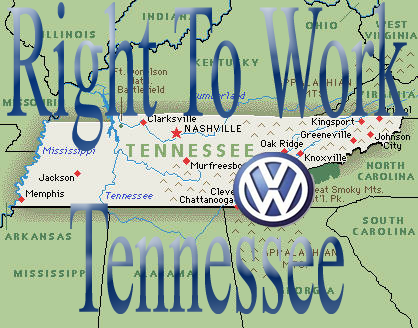August 2011 issue of The National Right To Work Committee Newsletter now available
The August 2011 issue of The National Right to Work Committee Newsletter is available for download August 2011 Newsletter in an Adobe pdf format for your convenience…

The August 2011 issue of The National Right to Work Committee Newsletter is available for download August 2011 Newsletter in an Adobe pdf format for your convenience…

Big Labor lawsuit against SC Nikki Haley rejected by U.S. Court Big Labor was upset, among other statements, that Governor Haley said, ““There’s no secret I don’t like the unions. … I will do everything I can to defend the…

Right to Work Committee Begins Lobbying Presidential Hopefuls (Source: July 2011 NRTWC Newsletter) This summer, New Hampshire is the site of an extended battle over the Right to Work issue, as pro-Right to Work citizens seek to secure two-thirds majority votes in the state House and Senate to override Big Labor Gov. John Lynch's veto of legislation (H.B.474) prohibiting compulsory union dues and fees. Because Right to Work has been in the New Hampshire news since both chambers of the state's General Court approved H.B.474 earlier this year, WMUR-TV (ABC) news anchor Josh McElveen decided to bring up the issue at the June 13 GOP presidential debate at St. Anselm College in Manchester, N.H. Mr. McElveen asked former Minnesota Gov. Tim Pawlenty, one of the seven 2012 presidential hopefuls participating in the debate, whether he would, if elected, support "a federal Right to Work law." Mr. Pawlenty ignited the debate's longest and most enthusiastic round of applause with his response: "We live in the United States of America, and people shouldn't be forced to belong [to] or be a member in any organization, and the government has no business telling people what group you have to be a member of or not. "I support strongly Right to Work legislation."

Private-Sector Employees and Employers Alike Reap Major Benefits (Source: July 2011 NRTWC Newsletter) Today, American employees and employers across the country are working hard and using their ingenuity to help their businesses recover from the severe 2008-2009 recession. Unfortunately, an array of laws and regulations imposed by the U.S. Congress and federal bureaucrats are hindering the efforts of workers, managers, and business owners. And the federal policies that authorize the firing of roughly 6.3 million private-sector employees should they refuse to pay union dues or fees as a job condition are among the very worst, if not the worst, obstacles to economic recovery. One indication of the damage wrought by the pro-forced unionism provisions in the National Labor Relations Act (NLRA) and the Railway Labor Act (RLA) is the state-by-state gross domestic product (GDP) data reported by the U.S. Commerce Department's Bureau of Economic Analysis. According to BEA data, from 2000 to 2010, the combined real output of the 22 states with Right to Work laws protecting employees from the forced-union-dues provisions in the NLRA grew by 21.8%. That percentage gain is well over half again as large as the combined real 2000-2010 growth of the 28 states that still do not protect employees from forced union dues. To put it another way, had the entire country grown by as much as current Right to Work states did over just this ten-year period, by 2010 our national GDP would have been $13.674 trillion in constant, "chained" 2005 dollars, roughly $575 billion above the actual figure. Forced Dues Not Justified, Morally or Economically

Chairman Wilma Liebman and other Big Labor members of President Obama's NLRB have proposed radical new rules for union organizing campaigns that would drastically curtail independent minded employees' ability to resist unionization. Credit: Radaris.com President's Handpicked Bureaucrats Ignore 2010 Election Results (Source: July 2011 NRTWC Newsletter) In the 2007-2008 and 2009-2010 Congresses, Big Labor's top objective was a rewrite of federal labor law making it even easier for union bosses to seize monopoly-bargaining power over millions of employees in the American private sector. Union strategists' legislative vehicle was the cynically mislabeled "Employee Free Choice Act," introduced by pro-forced unionism Congressman George Miller (D-Calif.) and Sen. Ted Kennedy (D-Mass.). After Mr. Kennedy died in 2009, union-label Iowa Democrat Tom Harkin took over as the lead Senate sponsor. The Miller-Kennedy-Harkin measure was more accurately called the "Card-Check" Forced-Unionism Bill. Even without a federal card-check mandate, union bosses have long been able to acquire "exclusive" (monopoly) power to negotiate employees' pay, benefits, and work rules solely through the acquisition of signed "union authorization cards." Consequently, individual workers under the peering eyes of union organizers may be intimidated into signing not just themselves, but all of their nonunion fellow employees, over to union-boss control. However, as stacked as current law is in favor of Big Labor's monopoly-bargaining power, employers nevertheless retain the right to stand up for their employees against union-boss intimidation tactics. But Miller-Kennedy-Harkin would have empowered union officials to impose monopoly bargaining through card checks automatically, with no recourse for any pro-Right to Work employee or employer. This legislation was totally contrary to the policy views of the vast majority of citizens, including union members. Last November 2, 31 Card-Check Bill Supporters Lost Their Re-Election Bids "Over the years, polls have shown Americans overwhelmingly oppose union monopoly bargaining, period," explained National Right to Work Committee President Mark Mix.

Chairman Wilma Liebman and other Big Labor members of President Obama's NLRB have proposed radical new rules for union organizing campaigns that would drastically curtail independent minded employees' ability to resist unionization. Credit: Radaris.com President's Handpicked Bureaucrats Ignore 2010 Election Results (Source: July 2011 NRTWC Newsletter) In the 2007-2008 and 2009-2010 Congresses, Big Labor's top objective was a rewrite of federal labor law making it even easier for union bosses to seize monopoly-bargaining power over millions of employees in the American private sector. Union strategists' legislative vehicle was the cynically mislabeled "Employee Free Choice Act," introduced by pro-forced unionism Congressman George Miller (D-Calif.) and Sen. Ted Kennedy (D-Mass.). After Mr. Kennedy died in 2009, union-label Iowa Democrat Tom Harkin took over as the lead Senate sponsor. The Miller-Kennedy-Harkin measure was more accurately called the "Card-Check" Forced-Unionism Bill. Even without a federal card-check mandate, union bosses have long been able to acquire "exclusive" (monopoly) power to negotiate employees' pay, benefits, and work rules solely through the acquisition of signed "union authorization cards." Consequently, individual workers under the peering eyes of union organizers may be intimidated into signing not just themselves, but all of their nonunion fellow employees, over to union-boss control. However, as stacked as current law is in favor of Big Labor's monopoly-bargaining power, employers nevertheless retain the right to stand up for their employees against union-boss intimidation tactics. But Miller-Kennedy-Harkin would have empowered union officials to impose monopoly bargaining through card checks automatically, with no recourse for any pro-Right to Work employee or employer. This legislation was totally contrary to the policy views of the vast majority of citizens, including union members. Last November 2, 31 Card-Check Bill Supporters Lost Their Re-Election Bids "Over the years, polls have shown Americans overwhelmingly oppose union monopoly bargaining, period," explained National Right to Work Committee President Mark Mix.

As Right to Work legislation finds its way back to the top of the legislative agenda in the state capital, Andrea Neal looks at the benefits of enacting a Right to Work bill in the Hoosier State: It doesn't take an economist to spot the common thread in these recent economic development headlines: Chattanooga, Tenn., July 29: "Volkswagen hires 2,000th employee." Shreveport, La., July 28: "NJ-based bag manufacturer to build Louisiana plant." Decatur, Ala., July 21: "Polyplex to build $185 million plant." West Point, Ga., July 7: "Kia builds vehicle No. 300,000." All four stories have Southern datelines. All come from states with right-to-work laws, which prohibit labor contracts that [force] employees to join a union or pay a union representation fee. This is the issue that prompted the five-week House Democratic walkout during the 2011 Indiana General Assembly. The Democrats -- a minority in both House and Senate -- had no other leverage. So when a right-to-work bill came up unexpectedly in a session that was supposed to be about the budget, redistricting and education, they bolted. Republicans capitulated and took the legislation off the table. In 2012, it will return with a vengeance, and this time Democrats can't avoid it. Right-to-work has been promised a full public airing. The Interim Study Committee on Employment Issues, chaired by Sen. Phil Boots, R-Crawfordsville, is taking a first crack this summer and hopes to recommend a bill by November. Gov. Mitch Daniels, who didn't support the bill last session, has hinted he might this time around.
The union bosses will never acknowledge it but it is becoming clear that Wisconsin’s reform of its union monopoly bargaining process for government worker’s is saving teacher’s jobs.
The union bosses will never acknowledge it but it is becoming clear that Wisconsin’s reform of its union monopoly bargaining process for government worker’s is saving teacher’s jobs.